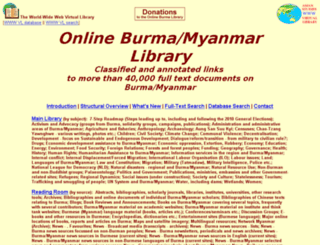Focal point
Location
The Online Burma/Myanmar Library (OBL) is a non-profit online research library mainly in English and Burmese serving academics, activists, diplomats, NGOs, CSOs, CBOs and other Burmese and international actors. It is also, of course, open to the general public. Though we provide lists of Burma/Myanmar news sources, the Library’s main content is not news but in-depth articles, reports, laws, videos and links to other websites, We provide a search engine (database and full text) and an alphabetical list of categories and sub-categories, but the Library is best accessed through browsing the 100 or so categories which lead to sub- and sub-sub categories. These tools should be used in combination.
Members:
Resources
Displaying 666 - 670 of 1151Under attack: a way of life
Much of what is happening in the conflict zones of
eastern Burma is difficult to capture with photos, video
and reports. It is a slow and insidious strangulation of the
population rather than an all-out effort to crush them...
Forced relocation in Burma’s former capital
The population of Yangon has experienced coercive
resettlement on a truly massive scale under military rule..."With its huts to
apartments’ scheme, the SPDC claims
to have placed many squatters in
new multi-storey housing on the site
of or near their former dwellings.
However, forced relocation in Yangon,
Mandalay and other cities in central
Burma continues today; victims of
fires, for example, are not allowed
to rebuild their old neighbourhoods
and residential areas are cleared to
Landmines: reason for flight, obstacle to return
Burma/Myanmar has suffered
from two decades of mine
warfare by both the State Peace
and Development Council and
ethnic-based insurgents. There
are no humanitarian demining
programmes within the country.
It is no surprise that those states
in Burma/Myanmar with the most
mine pollution are the highest
IDP- and refugee-producing
states. Antipersonnel mines
planted by both government
forces and ethnic armed groups
injure and kill not only enemy
combatants but also their own
The international community’s Responsibility to Protect
In the face of continuing grave violations of human rights
by the Burmese government against its own civilians, it is
imperative that the international community start to
respond to Burma in terms of the Responsibility to Protect
(R2P) principle...
The role of coercive measures in forced migration/internal displacement in Burma/Myanmar
Conclusion: "Most relevant reports and surveys I have been able to access state essentially that people from all parts of Burma leave home either in obedience to a direct relocation order from the military or civil authorities or as a result of a process whereby coercive measures imposed by the authorities play a major role in forcing down household incomes to the point where the family cannot survive. At this point, leaving home may seem to be the only option.


